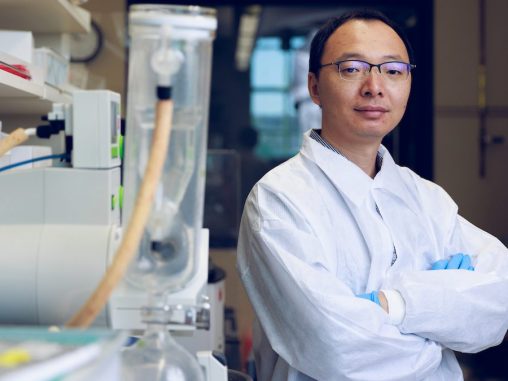Dr. Chao Zhao
Assistant Professor
Contact
- 3467 SEC
- phone (205) 348-9577
- fax (205) 348-7558
Research Areas
Education
- Ph.D., Chemical and Biomolecular Engineering, University of Akron, 2013
- M.S., Chemical Engineering, Zhejiang University, China, 2006
- B.E., Polymer Materials and Engineering, Harbin Institute of Technology, China, 2004
The Zhao Lab develops novel polymeric biomaterials for various biomedical applications, with emphasis on drug delivery and tissue engineering. The projects are driven by developing new technologies for the treatment of specific diseases.
Cancer pain is extremely prevalent, with millions of patients in the United States alone. At present, the management of severe cancer pain generally includes the use of morphine and other opiates. This can often result in undesirable side effects, and treatment with this type of medication is not always effective – one in four patients using opioids to manage cancer pain fails opioid therapy. There is a need for new therapeutic approaches for the management of moderate or severe cancer pain.
Tetrodotoxin, or TTX, is a potent neurotoxin that blocks voltage-gated sodium channels on the cell surface. TTX is 3,000 times more potent analgesic than morphine without the opioid-like side effects. However, the principal reason that TTX has not achieved clinical use, despite their great potency, is concern over their associated systemic toxicity. TTX toxicity causes neural blockade and muscular weakness resulting in diaphragmatic paralysis leading to respiratory arrest and death. The severe systemic toxicity limits the dosing of TTX and therefore limits the maximal duration of analgesic effects achievable.
The primary objective of Zhao’s research is to use materials-based approaches to address the limitations imposed by the toxicity of TTX and to move toward clinical translation of TTX for the cancer pain treatment.
Other projects in Zhao’s lab include the development of polymeric vectors for gene therapy and biomimetic scaffolds to enhance delivery of stem cells for cardiac repair.
Affiliated Areas
Chemical and Biological Engineering, Polymers and Soft Materials Research Center
Awards and Honors
- UASIS Outstanding Student Research Award, University of Akron, 2013
- Dean’s Graduate Fellowship Award, University of Akron, 2011-2012
- Outstanding Graduate Research Award, University of Akron, 2010
Dr. Zhao's Impact

UA Leading Investigation Into Alternative Pain Treatment
The research is exploring minuscule doses of a potent toxin to treat pain without opioids or nerve-block injections.
